Ecoagriculture conference
March 31, 2012
What could wildlife, conservation, aid, poverty alleviation, livestock management, development and research groups have in common?
We went to a 3 day Ecoagriculture conference which brought together government department heads, members of the above groups and an Ambassador from the UN to find synergies between the different approaches and draft a call to action to be presented at the Rio +20 Earth Summit in June.
The diversity of approaches brought together was amazing:

Can we present a united call to the world at Rio +20 in June?
What can be done to meet the food, nutrition and energy needs of rapidly growing populations, reduce deeply entrenched poverty and instability, take the right steps to adapt to and mitigate climate change and restore degraded ecosystems so that they can provide the clean water and fertile soils needed to conserve biodiversity and enable sustainable development worldwide?
In this forum, we looked for synergies between different approaches, shared and debated and drafted a call to action.
In summary, the conference called on the international community (governments, business communities, financial institutions, land managers, non-government actors and the scientific community) to work together to manage landscapes sustainably, develop investment mechanisms that will support truly sustainable land use practices and to strengthen the scientific basis for managing landscapes for multiple outcomes.
This summary does not do justice to the work done at this workshop so please visit www.landscapes.ecoagriculture.org if you are interested in further detail.
Most mind-blowing fact:
It blew us away to hear that the world loses more soil to erosion each year than it produces food and that the largest ‘export’ of the USA is eroded soil.
Until next time.
Liz

Liz is travelling in Africa with her husband Tony Rinaudo, a natural resource management advisor with World Vision Australia, encouraging communities, non-government organisations, governments, research organisations and others to scale up reforestation over large areas.
